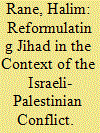| Srl | Item |
| 1 |
ID:
053854


|
|
|
| 2 |
ID:
061354


|
|
|
| 3 |
ID:
055757


|
|
|
|
|
| Publication |
Mar-Apr 2003.
|
|
|
|
|
|
|
|
|
|
|
|
|
|
|
|
| 4 |
ID:
061527


|
|
|
| 5 |
ID:
078265


|
|
|
|
|
| Publication |
2007.
|
| Summary/Abstract |
The Israeli-Palestinian conflict remains unresolved largely due to a failure to redress its asymmetry and the fact that the 'peace process' is not based on international law, specifically the resolutions of the United Nations. The mounting religious dimension is also perpetuating the conflict's intractability. The classical Islamic siyar1 with the doctrine of jihad at its core represents an authoritative 'Islamic' response to conflict and relations with non-Muslims. However, the militant response of some Palestinians to the Israeli occupation has been detrimental to their struggle for a restoration of rights, including self-determination. This article presents a theoretical framework for a reformulation of the classical doctrine of jihad. This reformulation must possess Islamic legitimacy, consistency with modern international norms, and the capacity to contribute to a just resolution of the conflict. The reformulation process needs to overcome the method of naskh (abrogation)2 and replace it with an approach to interpretation based on 'contextualization' so as to make accessible the broadest possible range of strategies in response to conflict contained in the Quran and the Prophetic traditions.3 Such a reformulation of jihad is necessary, though not sufficient, to generate the requisite international support for the norms of racial equality, dignity, and self-determination to redirect the strategic and material interests of influential states, shifting their foreign policies toward a just resolution of the conflict based on the resolutions of the United Nations
|
|
|
|
|
|
|
|
|
|
|
|
|
|
|
|